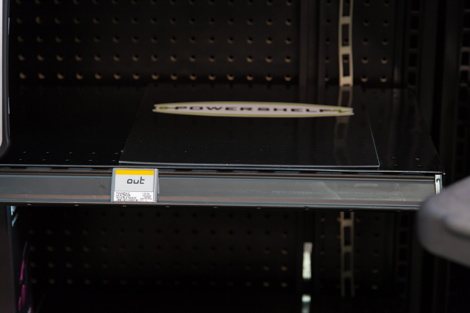Powershelf Out-of-Stock Sensors Focus of New Food Industry Study
Gail Chiasson, North American Editor
Powershelf out-of-stock sensors are the focus of new food industry pilot program, the Out-of-Stock Inventory Management test, measuring possible solutions to grocery out-of-stocks.
 The program is being led by a joint task force consisting of Giant Eagle, the Food Marketing Institute, the University of Maryland, Ernst & Young, dozens of leading manufacturers, and Powershelf. The program is running from November, 2015, through January, 2016, and will measure the effectiveness of Powershelf out-of-stock sensors in four Giant Eagle stores in the Columbus, Ohio area.
The program is being led by a joint task force consisting of Giant Eagle, the Food Marketing Institute, the University of Maryland, Ernst & Young, dozens of leading manufacturers, and Powershelf. The program is running from November, 2015, through January, 2016, and will measure the effectiveness of Powershelf out-of-stock sensors in four Giant Eagle stores in the Columbus, Ohio area.
Powershelf Out-of-stock sensors are part of the overall Powershelf system that enables stores to electronically update prices on LCD screens mounted on product shelves; at-the-shelf video advertising; and new Bluetooth Low Energy beacon functionality, enabling retailers using the system to connect their customers via a mobile app, sending location-specific marketing and promotional messages to consumers as they walk past the shelves in store aisles.
The Powershelf was co-developed by Compass Marketing‘s Tagnetics subsidiary, and by Panasonic System Communications Co., which is also manufacturing, marketing and branding the product. The Powershelf is being marketed as part of Panasonic’s full retail technology solution offering.
Unlike previous industry studies which emphasized the distribution chain, the Out-of-Stock Inventory Management test focuses on the individual store level, where industry studies have shown nearly three-quarters of all out-of-stocks occur. The Giant Eagle stores in this pilot will be divided into two groups: control and test stores, both of which will be outfitted with Powershelf out-of-stock sensors. The sensors will measure on-shelf availability in the yogurt, sports drinks, beer, and diapers categories to date, with leading manufacturers representing their interest as participants.
The sensors detect when products go out-of-stock and use the two-way communications capabilities of Powershelf to alert store personnel and distributor partners to remedy the situation. However, only the sensors in the test stores will send out alerts when products go out-of-stock. Other data collected from the test includes response time to address the OOS and estimated loss of sales on both non-promoted and promoted participating SKUs.
“The range of participants in this study – university professors, leading manufacturers, retailers, industry groups – shows just how important this issue is to the food industry,” says John White, chairman and co-CEO of Powershelf. “We believe that this test will provide us with even more powerful evidence as to the effectiveness of Powershelf.”
The grocery industry loses tens of billions of dollars in revenue every year due to out-of-stocks and rising consumer frustration. Industry studies show that about 8% of the products in a store are out-of-stock at any given time.
The proprietary technology of the Powershelf system provides constant power and two-way communications to software-enabled applications and devices which deliver a variety of advertising, merchandising and pricing services to customers. Powershelf also offers a nationwide network of thousands of highly trained professionals who perform on-the-ground services such as shelf monitoring and restocking, at-the-shelf marketing, and custom installation and maintenance of the Powershelf system.

Follow DailyDOOH